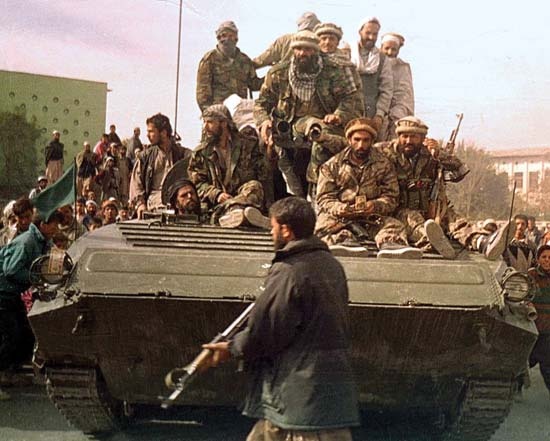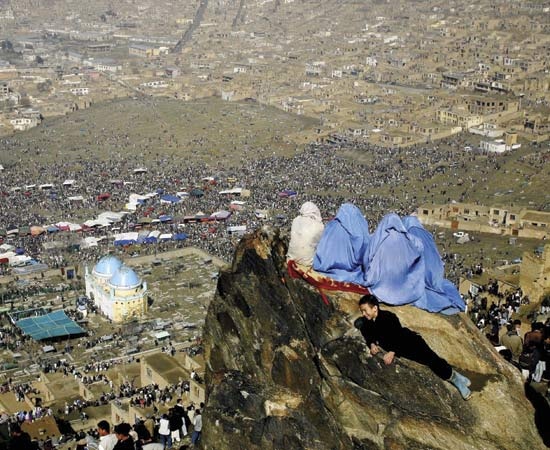Kabul
Afghanistan
Persian Kābol
capital and largest city of Afghanistan. It lies along the Kābul River at an elevation of about 5,900 feet (1,800 metres) in the east-central part of the country. The nation's cultural and economic centre, the city lies in a triangular valley between the two steep Asmai and Sherdawaza mountain ranges. Roads connect it with most other areas of Afghanistan, with Uzbekistan to the north, and with Pakistan to the east.
Kabul has existed for some 3,500 years. It is mentioned in the Rigveda (collection of Indian sacred hymns; c. 1500 BC), and Ptolemy, the Alexandrian astronomer, geographer, and mathematician, knew of it in the 2nd century AD. The city owes its long preeminence to its location commanding the passes from the north through the mountains of the Hindu Kush and from the south through the towns of Ghaznī and Gardeyz (Gardēz). It also commands the main approaches through the Khyber Pass to Pakistan and India. Kabul first became a regional seat of government in the 8th century. In the 13th century the Mongol invader Genghis Khan inflicted considerable damage on the city. Kabul was the capital (1504–26) of the Mughal Dynasty, under Bābur, and it remained under Mughal rule until 1738, when Nādir Shah (Nādir Shāh) of Iran took it.
 Kabul has been the capital of Afghanistan since 1776; during the First Anglo-Afghan War, British garrisons were massacred there (1842). It was the centre of much military and guerrilla activity after the outbreak of the Afghan War in 1978. The Soviet Union (Union of Soviet Socialist Republics) invaded Afghanistan (Afghan War) in 1979 in an effort to shore up a Marxist regime there; the invasion started when the Soviet Union began a large-scale airlift of combat troops into Kabul city. Early in 1980 a Soviet military command was established in Kabul and the airport was improved. Following the Soviet withdrawal from Afghanistan in 1989, internecine fighting between the Afghan guerrillas continued intermittently in the city and surrounding areas. By 1996, when the Taliban militia took control of Kabul, the city lay in ruins. The Taliban did little to rebuild it or repair its infrastructure and fled in advance of a coalition of Afghan and U.S.-led forces in 2001. The city remained the capital under an interim government.
Kabul has been the capital of Afghanistan since 1776; during the First Anglo-Afghan War, British garrisons were massacred there (1842). It was the centre of much military and guerrilla activity after the outbreak of the Afghan War in 1978. The Soviet Union (Union of Soviet Socialist Republics) invaded Afghanistan (Afghan War) in 1979 in an effort to shore up a Marxist regime there; the invasion started when the Soviet Union began a large-scale airlift of combat troops into Kabul city. Early in 1980 a Soviet military command was established in Kabul and the airport was improved. Following the Soviet withdrawal from Afghanistan in 1989, internecine fighting between the Afghan guerrillas continued intermittently in the city and surrounding areas. By 1996, when the Taliban militia took control of Kabul, the city lay in ruins. The Taliban did little to rebuild it or repair its infrastructure and fled in advance of a coalition of Afghan and U.S.-led forces in 2001. The city remained the capital under an interim government. Kabul is a blend of old and new buildings. Much of the old city has been torn down and rebuilt on modern lines. Kabul has many historical monuments, including the tombs of some of its rulers, and a number of gardens. Bābur's garden, including his tomb, is near the western extremity of the old city at the base of the Sherdawaza. The Dār ol-Amān palace houses the parliament and government departments. The University of Kabul was founded in 1932. Many of these institutions, however, suffered damage during the civil war.
Kabul is a blend of old and new buildings. Much of the old city has been torn down and rebuilt on modern lines. Kabul has many historical monuments, including the tombs of some of its rulers, and a number of gardens. Bābur's garden, including his tomb, is near the western extremity of the old city at the base of the Sherdawaza. The Dār ol-Amān palace houses the parliament and government departments. The University of Kabul was founded in 1932. Many of these institutions, however, suffered damage during the civil war.The city's industries include food-processing plants, rayon and wool mills, a furniture factory, a foundry, and a marble works. Kabul's population is mainly Persian- (Dari-) speaking, although there is a large proportion of Pashtuns. Pop. (2006 est.) city, 2,536,300; metro. area, 3,138,100.
- tailless whip scorpion
- tailorbird
- tail rhyme
- Tai, Mount
- T'ai-nan
- Taine, Hippolyte
- Taino
- Tainter, Charles Sumner
- taipan
- T'ai-pei
- Taipei
- Taiping
- Taiping Rebellion
- Taira Family
- Taira Kiyomori
- Taira Masakado
- Taira Masamori
- Taira Tadamori
- Tairona
- Tairov, Aleksandr Yakovlevich
- tairō
- Taishi Shōtoku
- Taishō
- Tait, Archibald Campbell
- Tait, Peter Guthrie